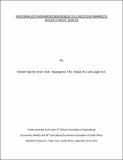Pastoralists Non‐Responsiveness To Livestock Markets In East Pokot, Kenya

View/
Publication Date
2010-09Author
Vincent Ng’eno, MK Korir, PM Nyangweso, Mary J Kipsat, BK Lagat
Metadata
Show full item recordAbstract/
One of the major challenges facing the state‐owned Kenya Meat Commission (KMC) in Kenya has been the inadequate supply of quality live animals for meat processing. It has been observed that the live animal throughput is inadequate and, as a result the existing meat processing facilities operate at less than 50% of their operational capacities. This has increased the fixed costs of operation thereby decreasing the export abattoirs competitiveness in the domestic and export markets. Overcoming the constraint of supply shortage of quality live animals requires, among other things, understanding the livestock producers’ marketing behaviour. This study was conducted with the main objective to assess the determinants of market off‐take rates for cattle and shoats in the pastoral areas of East Pokot District, Kenya. The multinomial logit model was used for econometric analyses using both primary and secondary data obtained from different sources covering the pastoral areas of Kenya. It was observed that in general, many pastoralists do not participate in the livestock market. Furthermore, for those pastoralists who participate in the market, the size of transaction (sale or purchase of cattle or shoats) was found to be very small. The implication of limited market participation is that under the production and marketing conditions, livestock production systems do not provide regular and adequate market supply of quality live animals at competitive prices, which adversely affect the efficient utilization of meat processing capacity and hence their competitiveness in the domestic and export markets.
